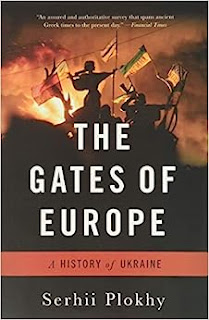from The Gates of Europe: A History of Ukraine by Serhii Plokhy:
Vladimir Lenin himself spelled out the “lesson of 1919” for his followers. According to Lenin, the Bolsheviks had neglected the nationality question. Consequently, the Bolshevik army returned to Ukraine in late 1919 and early 1920 under the banner of the formally independent Ukrainian Socialist Soviet Republic and tried to address the Ukrainians in their native language. Russification was out; cultural accommodation of the national revolution in Ukraine was in. In a move reminiscent of imperial co-opting of local elites, the Bolsheviks opened their party’s door to the Ukrainian leftists; these former Socialist Revolutionaries had acceped the idea of a Soviet organization of the future Ukrainian state and became known as Borotbists after the title of their main periodical, Borot’ba (Struggle). Accepted into the Bolshevik Party on an individual basis, they provided the Bolsheviks with badly needed Ukrainian-speaking cadres and a cultural elite. Peasants, too, were accommodated and given the land they had been promised for so long: in the spring of 1920, the Bolsheviks postponed their plans for establishing big collective farms on lands confiscated from the nobility and allowed the peasants to divide the land of their former masters.
The new strategy worked. In the course of 1920, the Bolsheviks were able to establish control over central and easter Ukraine and fend off the last real threat in the region. In late April 1920, the Polish armies of Józef Piłsudski, supported by the remnants of Petliura’s army, launched an advance on Kyiv from the front line in Volhynia and Podolia. Piłsudski’s goal was the creation of a Ukrainian buffer state between Polan and Soviet Russia. The offensive met with initial success. On May 7, Petliura once again entered Kyiv as head of the Ukrainian government, but this time there was no Galician army at his side. The price he had to pay for the support of his Polish allies was hardly of much importance in practical terms, but it had enormous symbolic significance. The chief otaman agreed to recognize Polish control over Galicia, delivering the final blow to the troubled relations between the two Ukrainian states.

No comments:
Post a Comment